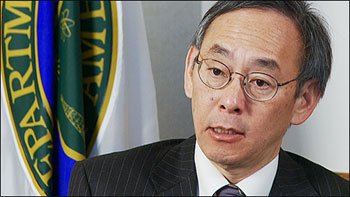 Steven Chu appears before the House Energy and Commerce Committee today.Cross-posted from the Breakthrough Institute.
Steven Chu appears before the House Energy and Commerce Committee today.Cross-posted from the Breakthrough Institute.
Step right up to see the latest chapter in the ongoing political circus surrounding the bankruptcy of solar manufacturer and federal loan guarantee recipient Solyndra. Today’s main attraction: Secretary of Energy Steven Chu’s long-awaited appearance before the eager Republican members of the House Energy and Commerce Committee.
Key questions remain about the ill-fated solar manufacturer’s dramatic demise earlier this year. Unfortunately, investigations on the Hill long ago veered into the realm of political point-scoring, rather than a serious inquiry designed to improve federal support for nascent and nationally critical clean energy technologies.
Taking a step back from the circus on the Hill, let’s make two things very clear.
First, the global energy system is modernizing and diversifying. For an array of motivations, from public health and climate change to security and economic growth, today’s economies demand a 21st-century suite of clean and reliable energy technologies to supply the $5 trillion-and-growing global energy market.
Second, the Department of Energy (DOE) Loan Programs Office was never particularly well-equipped to effectively address the “commercialization valley of death” — the persistent lack of risk-tolerant capital that plagues American innovators and entrepreneurs working valiantly to improve the nation’s energy, economic, and environmental security.
Parallel mandates of job creation and long-term technology innovation were bound from the start to come into conflict, as they did in the case of Solyndra. A risk-seeking loan office cannot operate simultaneously as a government employment program without provoking the political dustup we’ve witnessed in recent months.
While the Loans Program Office falls short in some areas, we must not forget the reason it was originally established, with strong support from both parties, by the Energy Policy Act of 2005: American entrepreneurs face a persistent challenge in securing adequate financing to demonstrate and commercialize promising advanced energy technologies, a market barrier that must be addressed by smart and effective public policy.
As we explain in a new policy report out today, the commercialization valley of death plagues promising energy technologies that require large capital infusions to prove they can work as a full-scale power plant or manufacturing facility.
Venture capital, which has for decades fueled the vibrant IT economy, lacks adequate funding to shepherd innovative technologies through the pipeline, and the high-risk, high-reward nature of innovative energy technologies makes them unattractive to conventional investment banks.
This dearth of risk-tolerant capital means that many potentially game-changing advanced energy technologies fail to ever make it into the marketplace. As a result, conventional fossil energy technologies are effectively insulated from new competitors, impeding the development of clean, affordable, and reliable domestic energy sources.
Congressional investigators should prioritize clean-energy commercialization solutions over political grandstanding and focus on identifying key lessons from the experience of the Loan Programs Office. Congress should put these lessons to immediate use to reform federal involvement in clean energy commercialization.
In particular, we recommend replacing the troubled DOE Loan Programs Office with a new Clean Energy Deployment Administration (CEDA) [PDF], a flexible, independent government investment agency — effectively a bank — charged with unlocking the capital necessary to move innovative energy technologies across the commercialization valley of death.
Unlike one-time government payments such as grants or tax credits, CEDA would have the flexibility to reuse returns on investments to back new private investments, highly leveraging limited taxpayer resources for maximum impact.
CEDA staff and fund managers would also face strong, market-based incentives to responsibly manage the agency’s overall portfolio to shepherd this initial taxpayer investment for the long-term. Indeed, CEDA could return a profit each year, similar to both the Export-Import Bank and Overseas Private Investment Corporation.
Under the leadership of Sens. Jeff Bingaman (D-N.M.) and Lisa Murkowski (R-Alaska), the proposed investment agency has already been well-vetted. The program has the support of leading venture capitalists, American energy companies, and the U.S. Chamber of Congress. And it received bipartisan votes of confidence from the Senate Energy and Natural Resources Committee in both the 111th and 112th Congresses.
The time to act is now. American entrepreneurs and businesses need congressional policymakers to stop playing politics and focus on the key reforms needed to ensure clean and affordable advanced energy technologies can be readily brought to market.



